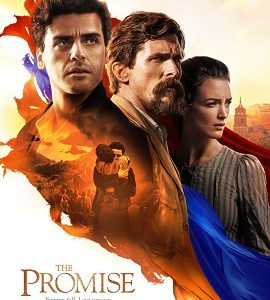t’s easy to be skeptical about preachy “man must” movies. You know: “Man must” not make war. “Man must” not ruin the Earth. “Man must” not be cruel to other people.
The Promise (2016) is not a “man must” movie. Rather, it’s “must-see.”
The film, which follows a love triangle as it progresses during the horror of the Armenian Genocide (perpetrated in the early 20th century by the Ottoman Turkish regime), is, basically, a miracle. It’s a miracle that it was made. It’s a miracle that people can see it.
What’s not a miracle: that it’s so brilliantly done. That should be credited to the human beings behind and in front of the camera—including the stupendous Oscar Isaac, who plays the young apothecary Mikael Boghosian with heart and compassion. Director Terry George, who also helmed Hotel Rwanda (2004), offers adept steering, what with the superb performances he elicits, as well as the taut pace he encourages. Editing and cinematography, by Steven Rosenblum and Javier Aguirresarobe, respectively, are expert, and the somber score, by the ever-reliable Gabriel Yared, is gorgeous, melancholy.
Perfect for the picture.
Yet these are not the only reasons why everyone should see The Promise. I don’t usually urge cinephiles to run after movies with messages for altruistic purposes, as I, in general, like films for their artistic value, rather than the causes they advocate. In this case, however, I have to step off my well-beaten path. The Promise is a monumental movie. It’s the first big Hollywood flick to be made about the Armenian Genocide, and that’s a milestone in itself. The fact that it’s terrific is like gravy. It’s crucial to watch this picture. Its plot concerns a heinous crime that is all-too-little known in the country I live in: the United States. Atrocities are shown onscreen. I gasped at them. So did many in the audience I saw the movie with. You will, too.
This is cinema of gasping. It’s immersive moviemaking, where you care about the characters, become as involved with them as they are with each other. You may forget that this is celluloid. It’s that powerful a picture.
There’s a small handful of minor issues. The script, credited to George and Robin Swicord, features a few bits here and there of flat dialogue, and there’s a lot of exposition. A couple of scenes are a little confusing. Still, it works as a whole, and is not pedantic. Everything flows speedily … but not too quickly that it becomes jumbled. The villains, especially Talaat Pasha—a real-life malefactor portrayed with sinister menace by Aaron Neil—are hateful. The heroes, including Christian Bale as journalist Chris Myers and Charlotte Le Bon as graceful love interest Ana Khesarian, are individuals you want to root for. Casting is terrific. Production values are splendid.
Shallow super-budget epics come and go. Masterpieces stay. The Promise is a masterpiece. It goes beyond plain and simple entertainment. It hits posterity.
Those who love movies should see it right away. Those who love justice, too. And those who love both … well, it’s an exact fit. This picture does justice to the memory of the Armenian Genocide. This picture attains the level of art and education at the same time.
I recommend seeing it. Just be prepared … bring a handkerchief. And your capacity to be wowed. For it’s not often you see a great movie in person.
The Promise is a great movie. And there’s no “man musts” about it.
Source http://curnblog.com/2017/04/27/armenian-genocide-film-the-promise-crucial-cinema/

